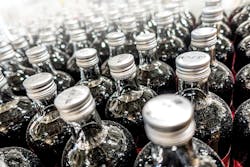Monitoring recipe and batch quality in real-time with flowmeters
One of the biggest challenges beverage producers face is batch quality issues caused by batches that don’t match the recipe. The main, overarching reason for this is that adding dry ingredients at certain points in the process is — in most instances — still a manual process and therefore subject to human error. Out-of-spec products will drive up ingredient costs and can damage a brand’s reputation if poor batches of product make it to store shelves and consumers are impacted.
Most beverage producers struggle with problems in manual processes, but there are automation and technology solutions that can eliminate the poor batching problems caused by manual processes. In this article, we first lay out the problems in detail before offering technology options to alleviate the problems. Along with the solutions, we highlight customer stories to show the impact of the solution.
An error-prone process
Typically, dry ingredients are added manually, and quantities are measured with load cells or scales. At any stage along the way errors can creep in, either in measuring or in adding. There are opportunities for misreading the scale or the recipe, setting the stage for adding too much or too little. It is also possible that an operator will forget if they added an ingredient and will add it again or skip it altogether.
In manually pouring dry ingredients into a mixture, some of it might spill, causing the measurement to be off and the final product to fall below final quality standards. Or the operator might not pour all of it in, figuring the batch will be alright anyway. When a producer contracts out to manufacturers with limited automation built into their processes, the chances of product inconsistency only increase.
In a recent case at a manually operated beverage production facility, management estimated that manual batch errors happen, on average, one to two times a month. A quick calculation, assuming a batch cost of $5,000 to $6,000 dollars in materials alone, would mean a loss of between $60,000 and $144,000 per year in lost batches.
What if the operator decides they can "fix" a batch that is not meeting the recipe requirements? This can lead to more wasted ingredients or incorrect formulations, which can lead to wasted production time and additional sampling time needed to verify the product. Or, if the mistake isn’t caught and the product does make it to market, it can lead to recalls and potential claims from stores and customers. At each point along the process where a mistake has been made, it will cost a producer extra money.
Skilled worker shortage
Compounding the challenges in the beverage industry is the looming shortage of skilled workers, similar to the shortage faced across manufacturing industries. A 2017 survey of trends and changes in the food and beverage industry by RSM US LLP, found that 47% of food and beverage producers cite the availability of skilled workers as a challenge that will negatively impact profitability.
INFORMATION
In the same RSM US LLP survey, 68% of food and beverage producers indicated they will increase their technology investments to counter the worker shortage, with product quality improvement as the top reason for doing so. It will be crucial that producers make the right choices in technology upgrades and investments when pursuing value and process improvements.
Solutions and success stories
An example of a value improvement through technology upgrades involves a global leader in orange juice production that was having trouble with inaccurate sugar concentration measurements — or Brix numbers — and was struggling with the fact that 50% of the loaded transport trucks were not compliant with specific load volumes.
By installing Coriolis mass flowmeters on the truck loading lines, the producer saw an improvement in product consistency going out to consumers and process availability. By using density measurements to monitor product quality, the producer was able to measure even the slightest change in the product caused by either adding ingredients or aeration, if applicable. The Coriolis meter, which can measure density, flow and temperature, is ideally suited for custody transfer, ensuring that trucks are loaded with the correct amount of orange juice at all times.
Using Coriolis meters, the producer was able to eliminate the need and cost for scales, and was able to increase throughput at the loading bay. With the demand for different SKUs today, such as orange juice with added calcium, or orange juice blended with other fruit juices, it is critical for a producer to know the consistency of each product that goes out and to ensure that the right juice is in the correct container or truck.
Another example comes from a carbonated beverage producer who was having similar challenges and was using contract producers. They struggled with the Brix variation in liquid sugar (high fructose corn syrup), which was impacting the quality of the final syrup. In addition, load cell inaccuracy resulted in off-spec quality, which required rework.
To solve this problem, the company installed Coriolis meters on the sweetener and water feed lines, which improved the overall plant throughput and helped it achieve consistent and repeatable syrup quality. By automating control using Coriolis meters, production time was reduced, as were labor costs. In initial testing, it became clear that the Coriolis meter was able to measure even the smallest addition of ingredients, such as a flavored syrup, which changes the density of the product flowing through the meter. This reduced the burden of time-consuming quality control checks for batch operators, because the Coriolis meter gives added confidence that each batch is correct.
The last success story is also found at a carbonated beverage producer that was able to improve quality and reduce costs by eliminating batch mistakes by operators and manual "fixes" that didn’t actually fix anything. By installing compact density meters to automatically validate batching via temperature-corrected density measurements, the producer was able to ensure adequate mixing. In this facility, performance and repeatability due to the new meters outperformed expectations, resulting in ingredient cost savings of between $60,000 and $144,000 per year, in addition to avoiding recalls.
Density measurements ensure that an operator knows when the recipe is off specification because the measurement will not match what is expected. Being able to see that in real-time means the default can be corrected immediately, thereby saving the batch. Eliminating manual batching has resulted in cost savings and improved overall plant efficiency.
The right technology makes the difference
What the solutions mentioned above have in common is that they allow an operator to verify that the correct amounts of each ingredient are added at each stage of the recipe. Adjustments can be made in real-time based on actual product consistency and makeup, because each ingredient creates a density signature that can be measured to verify the correct amount has been added. The right technologies also ensure repeatability and accuracy for each batch, regardless of changing temperatures and density of ingredients. And they eliminate the need for costly manual sampling methods which, in most cases, require slowing down or stopping the process, which means a delay until the end product is ready.
In addition, in custody transfer the right meter can make a significant impact on ensuring that the correct amount is transferred, which ensures fiscal accountability both internally and to external stakeholders. Knowing in real-time what is flowing through the process allows for corrections to be made before a problem can impact ingredient costs and product.
Tom Belling is a business development manager at Emerson, focused on the food and beverage industry. He has over 20 years of experience with Coriolis flow and density measurements in the food and beverage industry segments of dairy, alcohol, beverage, grains and sugars. Tom holds a bachelor’s degree in business administration from Cardinal Stritch University.

